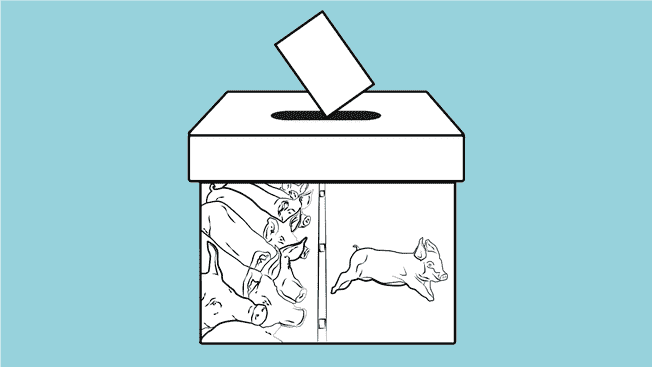Should all animals in Switzerland live according to the organic standard? Does the meat have to become more expensive so that less of it is eaten? It will be voted on on September 25th.
the essentials in brief
- The factory farming initiative demands the organic country of Switzerland in animal husbandry. The initiative comes from animal welfare, but is also relevant to climate policy.
- Proponents say animal dignity is disregarded in industrial livestock farming. Meat must become more expensive if species loss and global warming are to be stopped.
- Opponents consider the initiative unnecessary. Switzerland already has the strictest animal protection law in the world. Anyone who wants to buy organic products can do so today.
The template in detail
We vote on that
The factory farming initiative demands the organic country of Switzerland for eggs and meat. In 25 years at the latest, all cows, pigs and chickens should be kept under conditions that at least correspond to the 2018 Bio Suisse guidelines. The initiative also wants to enshrine the dignity of animals in the constitution.
That’s why this matters
The factory farming initiative is a vote on many questions: Should all animals live outdoors? How much meat should Switzerland produce? How much meat should be eaten in Switzerland? The initiative was launched in animal protection circles. But she also poses the question of whether and how Switzerland wants to make environmental and climate policy when it comes to eating.
The most important requirement for animal welfare is that all farm animals should be able to run outside. In the case of cows, beef cattle and laying hens, 84 percent can already be grazed today. With pigs and broilers, exercise is much less common: every second pig can go outdoors regularly, with broilers it is 8 out of 100 animals.
Approximately 17,000 farms today do not fulfill what the initiative requires when it comes to freewheeling. It is expected that if the initiative were accepted, many farmers would give up animal husbandry. All the more so since the initiative defines new maximum stocks per barn or farm.
In the case of fattening chickens, a maximum of 27,000 animals per barn is currently permitted, in the future it would only be 2,000. According to the Federal Council, this affects around 900 farms with poultry fattening. Farmers with pigs, cows or cattle would also have to reduce the number of animals. Exactly what size would vary from farm to farm. It depends on how much space a farm has available to spread liquid manure on.
Overall, the initiative would significantly reduce the number of animals in Switzerland. The initiative wants to achieve what a tax on meat would also result in: more expensive meat, less consumption. In order to prevent consumers from switching to cheaper products from abroad, the initiators have written an import clause in the text of the initiative. This also requires the strict organic standards for imported products. It is unclear how this would be implemented. It would be conceivable, for example, that Switzerland would only import labeled meat. According to the Federal Council, the new import regulations could only be enforced with a great deal of effort.
That’s what the proponents say
The initiative was initiated by the animal protection association Sentience Politics. The committee criticizes that the number of animals in Switzerland has increased by almost half in the past twenty years. Animals are considered commodities even though they are capable of suffering.
The environmental organizations Greenpeace and Pro Natura also recommend a yes. Meat production must be reduced to an environmentally acceptable level, they say. Because too many animals are kept in too small a space in Switzerland, moors and other habitats are over-fertilized. This fuels the loss of species and harms the climate.
The Greens, SP and Green Liberals also voted in favor of the initiative in Parliament. The association of smallholders also supports the initiative. In their interpretation, and also in the opinion of the initiators, everyone benefits from a “quality instead of mass” strategy when it comes to meat: the consumers, because it is healthy to eat less meat and because the use of antibiotics decreases with the organic attitude . The animals one way or another, but also the farmers, because their products received more value.
That’s what the opponents say
The Swiss Farmers’ Union disagrees with this view. He considers the initiative unnecessary. Switzerland already has the strictest animal protection law in the world. Anyone who wants to buy organic meat can do so – but the supply regularly exceeds the demand. From the farmers’ point of view, it is dishonest to ask for more animal welfare at the ballot box but not to buy this meat in the store.
According to the calculations of the farmers’ association, animal-based foods would be 20 to 40 percent more expensive. The association warns that this will lead to more shopping tourism. Due to the spatial planning requirements, it is hardly possible to enlarge stables or build new ones.
The Federal Council also feels that the organic standard is too high. SVP, FDP and Mitte are fighting the initiative together with the business associations. Politicians already promote animal welfare through financial incentives for direct payments, they say. In addition, the dignity of the animal is already protected at the legal level. There is no need for a new article in the constitution for this.
